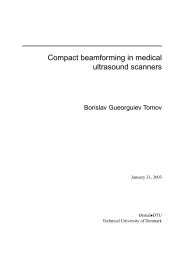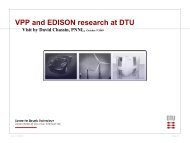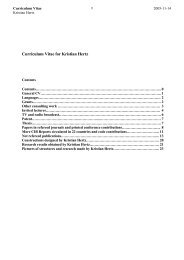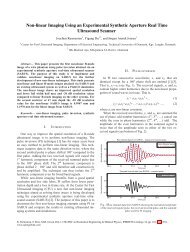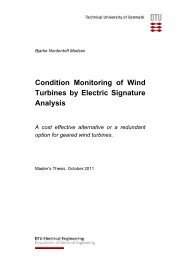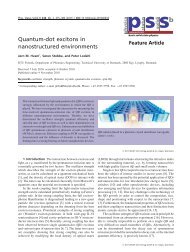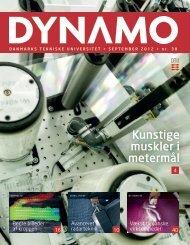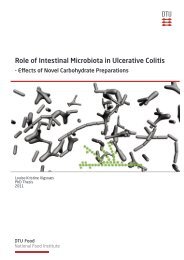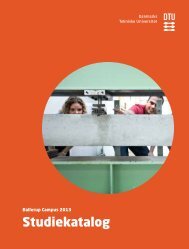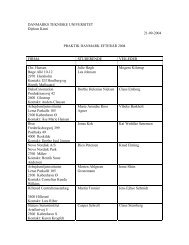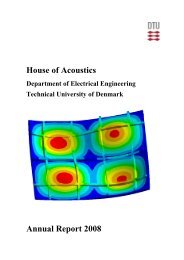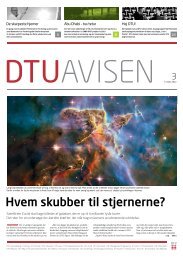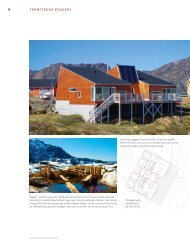MSc programs - DTU
MSc programs - DTU
MSc programs - DTU
Create successful ePaper yourself
Turn your PDF publications into a flip-book with our unique Google optimized e-Paper software.
32<br />
Physics and Nanotechnology<br />
<strong>MSc</strong> in Physics and Nanotechnology<br />
Semesters: 4<br />
Study credits: 120 ECTS<br />
Start: September 2007<br />
Seats: 60<br />
Application date: March 15 or June 1, 2007<br />
Physics and Nanotechnology is a major activity at <strong>DTU</strong> with focus on physics as the basis for modern<br />
technology. The gap between scientific research and technological breakthroughs is narrowing and<br />
in fields like nanotechnology, the need for engineers with training in both scientific techniques and<br />
industrial research and development is growing. The program covers advanced and technologically<br />
relevant theoretical and experimental techniques within modern physics. The applications cover a<br />
wide range of topics including development of nanostructured materials with tailored electrical,<br />
magnetic, optical, mechanical and chemical properties; fabrication and integration of nano- and<br />
microcomponents; modeling of complex, biological systems; optical information transfer and data<br />
storage.<br />
The program covers four subject areas:<br />
Atomic Scale Physics focuses on the understanding and ”bottom-up” design of materials based<br />
on quantum physics. The area covers experimental and theoretical techniques to investigate and<br />
manipulate atomic-scale systems.<br />
Nanosystems engineering focuses on the ”top-down” design and fabrication of nano- and microsystems<br />
for use in research and industrial applications. Students are trained in state-of-the-art nano<br />
and microfabrication technologies in a combination of theory, simulation, device fabrication, and<br />
device characterization.<br />
Optics and Photonics focuses on understanding light propagation and light-matter-interaction and<br />
its application to design of photonic devices and systems. Applications include optical communications,<br />
nanophotonic devices, sensing and biomedicine.<br />
Biophysics and complex systems focuses on understanding and simulating function from molecules<br />
over cells to complete organisms. Further, problems of fluid dynamics are investigated. Both experimental<br />
and theoretical methods are applied.<br />
Students enrolled in the program are not limited to one of these four subject areas but are able<br />
to combine topics. Further, a special program with specialization in functional nanostructures with<br />
additional requirements in the study plan is offered.<br />
Career opportunities: Previous students have found employment primarily in research and<br />
development, in private or public organizations. Skills in advanced physics<br />
are in general applicable in a wide range of job types.<br />
Prerequisites: BSc degree from an internationally recognized university. Basic knowledge<br />
at the physics bachelor level within the topics of classical mechanics,<br />
thermodynamics, statistical physics, electromagnetism, and quantum<br />
mechanics. Prior knowledge within nanoscience or nanotechnology is an<br />
advantage but not a strict requirement.<br />
Program coordinator: Associate Professor Jakob Schiøtz<br />
(kandidatstudieleder@fysik.dtu.dk)<br />
Department: Department of Physics (www.fys.dtu.dk)<br />
Department of Micro- and Nanotechnology (www.mic.dtu.dk)<br />
Department of Communications, Optics and Materials<br />
(www.com.dtu.dk)<br />
Read more: www.fys.dtu.dk (Department web site)<br />
<strong>MSc</strong> in Functional Nanostructures<br />
Semesters: 4<br />
Study credits: 120 ECTS<br />
Start: September 2007<br />
Seats: 60<br />
Application date: March 15 or June 1, 2007<br />
Functional Nanostructures is a specialization under the Physics and Nanotechnology program with<br />
a special focus on nanoscience and nanotechnology, an area of research where <strong>DTU</strong> is particularly<br />
strong internationally.<br />
In comparison to the Masters programme in Physics and Nanotechnology, the selection of courses<br />
for the student to take is shorter, with special emphasis on nanoscience.<br />
The program covers three subject areas:<br />
Atomic Scale Physics focuses on the understanding and ”bottom-up” design of materials based<br />
on quantum physics. The area covers experimental and theoretical techniques to investigate and<br />
manipulate structural, electrical, magnetic, mechanical, and chemical properties of atomic-scale<br />
systems. Topics include electronic quantum devices, molecular electronics, spintronics, surface and<br />
nanoparticle reactivity, fuel-cell and hydrogen-storage materials, electronic structure theory, and<br />
atomistic simulation of materials.<br />
Nanosystems engineering focuses on the ”top-down” design and fabrication of nano- and microsystems<br />
for use in research and industrial applications. Students following the program are trained<br />
in state-of-the-art nano and microfabrication technologies in a combination of theory, simulation,<br />
device fabrication in the DANCHIP cleanroom facility at <strong>DTU</strong>, and device characterization in the<br />
modern laboratory facilities at MIC and COM.<br />
Optics and Photonics focuses on understanding light propagation and light-matter-interaction<br />
and its application to design of photonic devices and systems. The applications are within optical<br />
communications, nanophotonic devices and sensing. Topics include lasers, microstructured fibers,<br />
photonic crystals, quantom photonics, terahertz radiation, plasmonics, biosensing, and high-speed<br />
transmission.<br />
Career opportunities: Previous students have found employment primarily in research and<br />
development, in private or public organizations.Skills in advanced physics<br />
is in general applicable in a wide range of job types and there is good<br />
opportunity for variation.<br />
Prerequisites: BSc degree from an internationally recognized university. The students<br />
should possess basic knowledge at the physics bachelor level within the<br />
topics of classical mechanics, hermodynamics, statistical physics, electromagnetism,<br />
and quantum mechanics. Prior knowledge within nanoscience<br />
or nanotechnology is an advantage but not a strict requirement.<br />
Program coordinator: Associate Professor Jakob Schiøtz<br />
(kandidatstudieleder@fysik.dtu.dk)<br />
Department: Department of Physics (www.fys.dtu.dk)<br />
Department of Micro- and Nanotechnology (www.mic.dtu.dk)<br />
Department of Communications, Optics and Materials<br />
(www.com.dtu.dk)<br />
Read more: www.fys.dtu.dk (Department web site)



